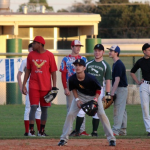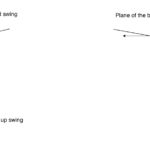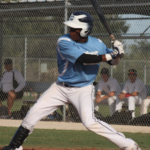Play the game!
Today’s youth and high school players are bigger, faster, stronger, and throw harder than they ever have. The number of players who throw 90 and 95 miles per hour is at an all time high. I would also guess that the number of players who run sub 6.6-60s is also at an all time high (this one is just an observation). There is little doubt that the physical condition player is much better than it ever has in the past.
In spite of these physical advances, the players who still make it, are the ones who do something none of the other players do... play the game. So much emphasis is placed on velocity, speed, strength, what the player looks like in batting practice, and what kind of movement the player has defensively, that the most important aspect of the game is overlooked... playing the game itsself. Throwing 90 mph doesn’t do you any good if you can’t throw strikes and don’t have secondary pitches. Running a 6.7 does little good if you can’t get good jumps, and can’t take proper angles on the bases.
The problem with these “showcase” players is that they never really learn to play the game. They don’t have to. They’re bigger, faster, and stronger, until they get to a level of play where they aren’t anymore. Then they have reached their limit and have no chance of advancing.
Sign-Up for our Blog and Bronze Library Here!!!
So the question becomes, why do so many players not understand the game? There are probably many reasons one could point to. A simple reason is so much emphasis is placed on their measurables, they are able to make teams and play because they are fast, strong, and throw hard.
Another major reason is a lack of quality instruction. Believe me, there is a lot of good instruction out there. I learned to play the game from some of the best in the business. I went to camps with Jack Perconte (former Major Leaguer), and played for Dave Lindley (IHSBCA Hall of Famer and former coach at Hinsdale South), and Paul Hoel (current coach at Hinsdale South High School). These coaches were concerned with teaching the correct way to play the game and paid attention to the small details of the game. Not every player is fortunate enough to have mentors like these. I truly believe the coaching world needs more coaches at all levels who are interested in coaching the game, and not interested in winning the game.
The biggest reason I believe many talented players today don’t know how to play the game is simply that they don’t watch it. I call it the Sports Center effect. It is really a much deeper problem than just sports (I am as guilty as anyone), but our society has become one of instant gratification. Why watch a three hour baseball game when you can watch a half hour of Sports Center and see every home run and every diving play of the day? The answer is simple, you don’t learn the game when you watch Sports Center. All you learn is that Yasiel Puig can it a baseball 450 feet, and Justin Verlander can throw 100 mph after 120 pitches.
By watching the game, the entire game, players can learn how, and how not, to run the bases. Players can see technical techniques that work and learn why a pitcher throws a 1-2 breaking ball in the dirt after a four seam fastball at the letters. They can see how to properly execute a rundown, how to get behind a fly ball, and how to properly apply a tag.
One of the first things I did when I became a head coach at age 23 was to watch games and write down every situation we needed to cover to be prepared for the season. Give your players homework to watch a game and write down a page worth of notes on the positive and negative things they notice. It may not be the first time they have ever watched an entire game, but it will certainly be the first time they have ever watched the game as a student.
***Cornerstone’s silver certification has over 60 tactical games and challenges for practice that will help teach your players how to play the game and not be just a showcase player***
 Posted by Kyle Nelson
Posted by Kyle Nelson- Posted in Uncategorized
 Jul, 11, 2013
Jul, 11, 2013 10 Comments.
10 Comments.
Elite members login here
Check out what’s New/Hot!
Recognizing, Diagnosing, and Fixing Common Hitting Flaws eCourse The 3 metrics we tested on Blast motion sensors this year Sneak Peek Inside an Elite Q and A The batting practice continuum Elite Member’s area table of contents 50+ “Chaos” hitting drills
5 sample Chaos hitting drills FREE
Mental Skills and Culture Building The hitting pyramid Welcome Elite Member, Trey! Ideas for a pitcher first practice 12 week bat speed improvement plan Make plans this offseason to have your team playing their best baseball at the end of the year” Top 5 hitting drills to translate practice skill to game performanceHow we used Blast Motion sensors with a team in 2019
What to do if your hitters are overmatched Welcome Elite Member, Tommy! Setting your baserunners up for success Welcome Elite Member, Mike! A consulting call with Elite Member Matt FREE Web Clinic: Developing Athletic, Consistent, Extraordinary Infielders
 Coach Kyle Nelson
Coach Kyle Nelson





Kyle, This is a very good article! I am with you on thew way the game is played, and the way it is taught. I have a writing program for you. http://bigdogbaseballusa.com/write-for-us/ I will be offering something similar in the next couple of weeks to business people that are Baseball People. I will have more info in the next day or so. This is also a message going out to all my writers and potential writers.
Thanks
Bob Brown
Well said. I get asked quite often why our kids are so ill-prepared to “play the game of baseball”. My answers are similar to yours in that our players just aren’t students of the game anymore. They really don’t watch it being played at a high level, they don’t get out on an open field with their buddies and just play anymore, and, and this is big in my opinion, they are being taught at our local indoor facilities how to “pick it, hit it, pitch it” but never get to experience how to “play it”. The small parts of the game that win games (I call the little things),ie. communication, bunting, pre-pitch movement, getting reads on bases, timing pitchers, etc just are not being learned due to the restraints caused by enclosed walls and the fact that facilities make their money on the promises that the kid will hit better, look better, and throw harder.
@Glen – Thanks for the response. Could not agree more in regards to unstructured play. You’d be amazed at how quickly kids pick up on things in those types of settings. They will realize after several unsuccessful rundowns that there needs to be some kind of communication and that if you move toward the ball as it is being thrown to you, you can cut down the distance and end the rundown in one or two throws. Because this type of learning rarely happens, players just assume that if they are doing something wrong the coach will tell them what to do instead of searching for solutions on their own. Now we are just creating robots, not “think on your feet” problem solvers.
The other thing that is amazing is when you get players who are students of the game. They are heads and shoulders ahead of everyone else mentally. You can really tell they understand the tactics behind the game, not just how to throw and hit.
I think this is something every segment of society is facing right now. I am also a teacher, and I see this need for “instant gratification” happening all over the place.
Kyle,
I heartily agree with almost everything said here. Good subject matter and as you say, its a cultural issue as well. The one area I question is the bigger, faster, stronger assertion.
In the smaller communities where athletics are no longer heralded as a primary focus, we see players that are only 1-sport or 2-sport athletes. Several years ago they were 3-sport and 12 years ago they were 4-sport. Now, we see players that really aren’t even athletic. They spend as much time with working and making money as they do with electronics and other socializing activities. Their sport is not a priority. This trend should be concerning to all of us because our sport is shrinking and thus, we struggle to promote its values.
Unfortunately, the major league guys at the top of our system aren’t helping. Many of them promote the very problem. They are more interested in their bottom line than promoting healthy lifestyles and the great game of baseball.
Perhaps this is another topic to pursue but I’m commenting because of the decline I see and the lack of attention paid to it. The larger communities will notice it soon. The grassroots are already in trouble.
MW
@Mark-
Thanks for the reply and conversation. There are many benefits to playing multiple sports including, learning to compete and learning to use your body in a variety of different ways. Many players feel as though they are falling behind if they play another sports. The reality is that most kids who only play one sport to “concentrate” on baseball really do nothing more than take a hitting lesson once a week, spend a few hours in the weight room, and play video games with the rest of their free time. Their time would be much better playing another sport and learning how to be an athlete.
My assertion that players are bigger, faster, and strong is simply in regard to the documented increase in velocity and decrease in running times. As I mention, this doesn’t necessarily mean they are better players, they just look better at a showcase.
Thanks for reading.
Kyle
This is so true. Great points by all. This has been a common theme in my part of the country (southern Virginia) where showcase teams rule. Some organizations do it the right way and practice/learn together during the week then play on the weekends but they are rare. Most organizations will pull from larger areas and just meet on the weekends at some tournament God knows where to “showcase” themselves. Where is the coaching and teaching???
This is not only happening in baseball but other high school aged sports. You should read this guest post This is a guest post by Tony Lowe from Elev8 Lacrosse Academy.
This topic has changed our way of thinking at our High school to change the way we practice and what we are now asking of our players. I am hoping it will pay off so our HS players know how to play the game together and win together as apposed to “how well did I play today”.
Give me the kid with the dirty uniform that wants to learn the game!
I enjoyed reading your comments. You said everything that I’ve been saying for years. You hear people say all the time, that young players don’t appreciate the game any more. I have a new saying (having also been a high school teacher)…”they don’t know that they don’t know.”
This is my description of the evolution of youth baseball – We took community baseball, with reasonable fees, coached by dads, and spread them out all over the place, called it “travel ball”, charging outrageous fees, with the same coaches, less instruction (if any) and more games.
@Jimmy – Far too many games. We don’t even come close to the recommended practice to game ratio for any level below high school.
A few years back I was a part of a really really good travel organization that put the emphasis on development of players and really did things right. We didn’t have the most talented players because we didn’t just go out and recruit the best players, we tried to develop the players that were interested in our organization. Everything was great… until the games started. Lose a few games and it’s like all of that development that went on in the winter was forgotten. If only people knew how important a practice is.
I agree with your statement “I truly believe the coaching world needs more coaches at all levels who are interested in coaching the game, and not interested in winning the game.” Just this past week I was talking to a fellow coach about this; my comment was that I felt winning can get in the way of development if we are too focused on winning. I prefer winning over losing but I prefer development over winning and I believe development will produce more wins in the end.
@ Marshall-
Great points! Many coaches are former players and former players are competitive by nature. Unless they had coaches who stressed process over outcome, it is difficult for them to see that the process is what’s really important and will ultimately lead to more wins.
With that being said, a player’s health (in baseball this dilemma occurs with pitchers) should never be put in jeopardy in the name of winning. That’s stuff you see on TV with the guys who make millions.
Thanks for reading, I have enjoyed your comments and think you have a great perspective on youth sports.
Kyle